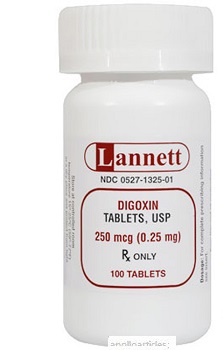Digoxin Canada
Description
Digoxin is a safe and effective medication that consists of natural ingredients. Being derived from digitalis plant leaves, the treatment helps achieve a desirable effect without a dangerous impact on other health conditions. Digoxin is used to balance the heart rhythm and strengthen the heartbeat. The medication is commonly prescribed for patients to treat heart failure or atrial fibrillation. It is important to get doctor’s recommendations and instructions before the treatment course. Consult your healthcare specialist about Digoxin off-label administration.
Recommendations
 Follow safety directions and prescription instructions to make Digoxin intake a beneficial experience. Take the drug in accordance with the optimal dose and duration of the medication course recommended. Digoxin should be taken regularly, on a daily basis. Try to administer the treatment at the same time each day. Taking liquid Digoxin, measure the necessary dose with syringe provided. Frequent blood tests will be required by the doctor to be able to track the progress of the treatment course. Besides, since the medication produces a severe impact on kidneys, their functioning should be also checked often.
Follow safety directions and prescription instructions to make Digoxin intake a beneficial experience. Take the drug in accordance with the optimal dose and duration of the medication course recommended. Digoxin should be taken regularly, on a daily basis. Try to administer the treatment at the same time each day. Taking liquid Digoxin, measure the necessary dose with syringe provided. Frequent blood tests will be required by the doctor to be able to track the progress of the treatment course. Besides, since the medication produces a severe impact on kidneys, their functioning should be also checked often.
Continue taking Digoxin for the full length of the treatment course even if the symptoms disappear and the overall condition has balanced. Additionally, never stop Digoxin treatment course suddenly, as it can cause harmful complications and condition aggravation. If you have missed one dose, you should skip it, in case the following one is within 12 hours. Never increase or double Dixogin dose to eliminate the risk of side effects occurrence.
Precautions
Do not start the medication intake without doctor’s consultation. Make sure you are not allergic to the drug before its administration. Digoxin should not be used by patients with severe heart rhythm disorder, called ventricular fibrillation. Other health disorders and illnesses can interact with the medication. Tell your doctor about all the diseases you have, especially kidney or liver disorders, thyroid problems, an electrolyte imbalance, diverse heart disorders, Wolff-Parkinson-White Syndrome, history of stroke, heart attack and related conditions. Breastfeeding and pregnant women should avoid the medication use, since its components can harm the health of a nursing or unborn child.
Drug Interactions
Inform your healthcare professional about all the prescription and generic drugs, herbal products and similar pharmaceutical remedies you are taking to avoid dangerous Digoxin interactions. Severe side effects and condition aggravation can occur as a result of the medication misuse. Do not administer Digoxin with the following treatments: Gentamicin, Diltiazem, Quinine, Tetracycline, Ranolazine, Trimethoprim, Itraconazole, Propafenone, Captopril, thyroid supplements, beta-blockers, sympathomimetics and others.
Side Effects
Seek emergency medical assistance in case your condition aggravates and the symptoms of allergic reaction appear. The most dangerous Digoxin complications ever reported include uneven or constantly changing heart rate, blurred vision, severe vomiting, nausea, decreased appetite, stomach discomfort, hallucinations, depression, agitation, confusion, suicidal thoughts, etc. Call your physician in case the common reactions, such as skin rashes, headache, weakness, dizziness and others do not disappear.

